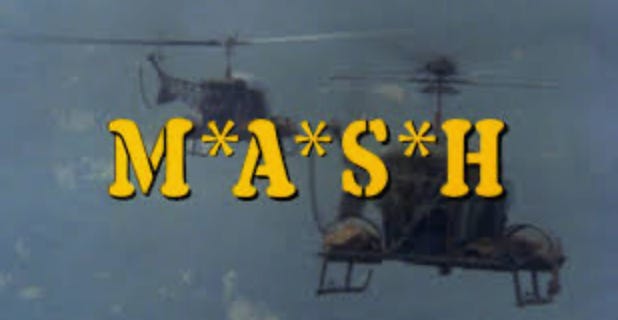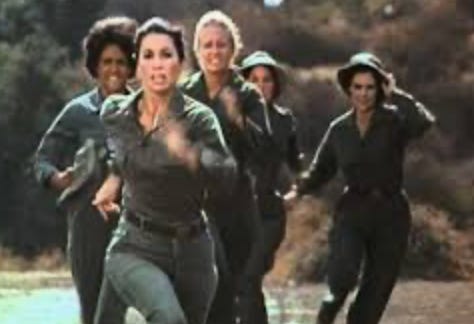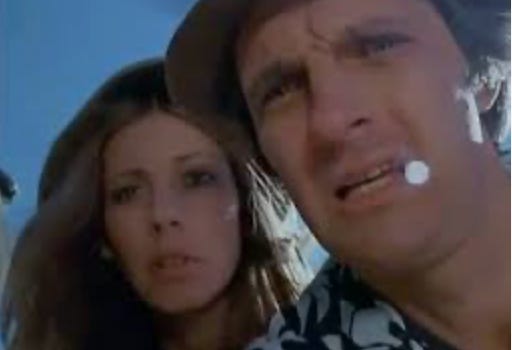Last night, with a spare half-hour and my brain fried from a day of reading and writing, I decided to dive into the eleventy million streaming apps on my iPad. The first one I opened, Disney, served up M*A*S*H as an option, and for some reason, the "Captain Tuttle" episode immediately popped into my head.
"Tuttle" was an ep I'd only seen once, way back in my early teens. It stuck with me, perhaps because I only saw it that once. M*A*S*H was one of the few good shows back in the Before Times (before the first Golden Age of TV, circa 1990) and I watched it over and over again. Some eps I must’ve seen a dozen times. But “Tuttle” only that once.
Watching it again last night, for the first time in maybe 45 years, I was struck by its absurdist nature. It was clearly influenced by Joseph Heller's Catch-22, which would’ve still been one of the significant novels of the decade when M*A*S*H first aired.
The storyline is simple: In the opening scene Hawkeye and Trapper are loading a heavy box onto a truck, making out like black marketeers, but of course they're supplying an orphanage. When the nun driving the truck asks who to thank, Hawkeye suggests Captain Tuttle, his imaginary friend from childhood. From there, a whole episode of Kafka-esque hilarity ensues.
As a kid, it made a strong impression on me, and I always waited for it to reappear on TV, but it never did. This was pre-streaming, and you couldn't just call up an episode. So, after 45 years, last night I finally reached my watch-list nirvana. I had to do an Arc search to find it, hoping I'd remembered the name correctly. I had! Season 1, Episode 15. A surprise, as I later thought it such a sophisticated piece of storytelling, it must have come from later in the series.
But what really hit me, what I wasn't expecting, was the opening sequence. M*A*S*H is famously an anti-war series, but looking back nearly half a century later, it was also a critique of modernity and bureaucracy, much like Catch-22, and obviously a critique of the Vietnam War, which was raging concurrently.
And that title sequence. If you're my age, you've seen it thousands of times, with the famous opening chords of the theme music inviting the bubble-canopy choppers to fly in over what were supposed to be the hills of Korea (but were probably the San Fernando Valley).
Through early morning fog, I see
Visions of the things to be
The pains that are withheld for me
I realize and I can see
That suicide is painless
It brings on many changes
And I can take or leave it if I please
And then you see all these doctors and nurses absolutely hammering it up the hill to the helipad, sprinting to get their wounded soldiers into surgery. You see all the cast, one by one, in their hero shots.
The show was built on conflict, as all stories are, with the Korean War, standing in for Vietnam, but the interpersonal clashes, like Frank Burns vs Hawkeye and Trapper, provided as the perma-friction for the narrative. (Side note: Larry Linville, who played Burns, did an incredible job crafting a three-dimensional character out of what could have been a two-dimensional caricature.) The individual political differences were there, but they were implied, not foregrounded like they would be today.
What struck me, though, and it was a gut punch, was this: in that opening sequence, despite being in a terrible situation and regardless of all their differences and the constant conflict that drove every episode, these people are all running together, as hard and as fast as they possibly can, towards a common objective. Even Frank got his hero moment in the title sequence. For a moment, I’ll confess I was a little overcome.
It was a reminder of what we’ve lost as a culture, our ability to unite, to set aside our stupid fucking differences, and to work together for anything even approaching a shared purpose.
So much about the show looks primitive now. Partly because it’s both a period piece and an artefact of the period in which it was made. But watching it, feeling deeply unsettled by that opening sequence, I was struck by the profound belief that we haven’t really advanced at all in fifty years. And we haven’t gone backwards. Something much worse has happened to us. We’re lost.
Visions of the things to be, indeed.
Still a great ep, though.


